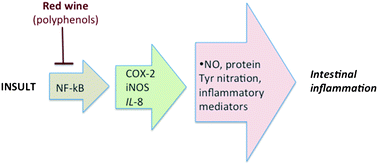The development of new therapeutic approaches, combining efficacy and safety against intestinal inflammation, notably inflammatory bowel disease (IBD), has emerged as an important goal due to the significant side effects and the lack of effectiveness of standard current therapies. Recently, several studies described the health-promoting effects of red wine, including anti-inflammatory properties, but the molecular mechanisms underlying its beneficial role remain largely unknown. Red wine is rich in phenolic compounds and it has been suggested that the positive effect of red wine intake might be attributed not only to the antioxidant properties of these compounds but also to the modulation of signalling cascades in connection with physiological and pathophysiological conditions such as inflammatory processes. This study assesses the potential anti-inflammatory action of a red wine extract (RWE) enriched in polyphenols in a cellular model of intestinal inflammation using cytokines-stimulated HT-29 colon epithelial cells. RWE suppressed cytokines-induced IκB degradation and interleukin-8 production in a dose-dependent manner. Coherently, key inflammatory mediators downstream NF-κB activation; notably cyclooxygenase-2 and inducible nitric oxide synthase were maintained at low levels by RWE in the presence of the cytokines. Additionally, RWE inhibited both the increase of nitric oxide derived from iNOS and of protein tyrosine nitration, a biomarker of nitrosative stress that typically requires the reaction of nitric oxide with the superoxide radical. Taken together, the anti-inflammatory action of RWE, mechanistically supported by the modulation of cascades orchestrated by NF-κB and involving nitric oxide, suggests that RWE (a readily straightforward preparation when compared with the purification of specific compounds) may represent a simple and inexpensive therapeutic strategy in the context of intestinal inflammation.

You have access to this article
 Please wait while we load your content...
Something went wrong. Try again?
Please wait while we load your content...
Something went wrong. Try again?


 Please wait while we load your content...
Please wait while we load your content...